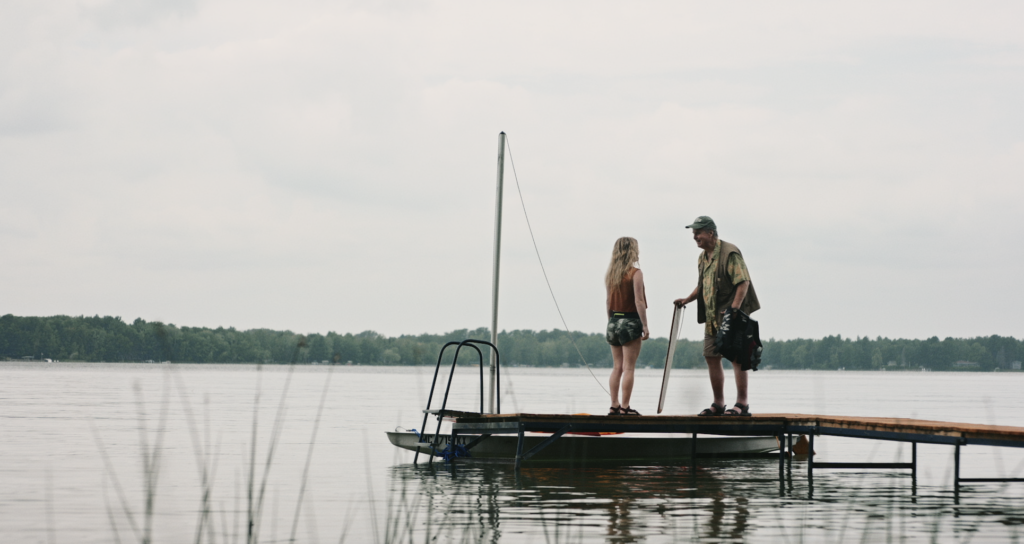Director Sierra Falconer’s UCLA Thesis Project, ‘Sunfish (& Other Stories On Green Lake),’ Makes the Big Screen
Green Lake is the hub around which four coming-of-age tales are interwoven, and Falconer does so with a precision that is, if studied, then also gently stated.

Green Lake is a sizable body of water situated toward the northern part of Michigan. It’s surrounded by a township of the same name and has a modest population — about 6,700. The claim to fame of this not-so-famous place is the prestigious Interlochen Center for the Arts and an attendant school. Among its alumni are the actress Tovah Feldshuh, opera singer Jessye Norman, and pop star Chappell Roan.
Screenwriter and director Sierra Falconer isn’t a graduate of the “rich kids’ camp” — that’s what one of the characters in her debut feature, “Sunfish (& Other Stories On Green Lake),” calls the place — but she did attend the rich kid-adjacent Wesleyan University. Ms. Falconer went on to earn a master’s in production and directing at the University of California at Los Angeles. “Sunfish” is her thesis project, an academic effort subsequently picked up by the Sundance Film Festival — a nice feather in the cap for a 20-something filmmaker.
Hewing to the old saw about “writing about what you know,” Ms. Falconer predicated her screenplay on experiences gleaned from growing up in an environment that is, to pinch a phrase from Thomas Hardy, far from the madding crowd. Her grandparents’ home on Green Lake was bereft of cellphone service and, until recently, the internet. It was, Ms. Falconer says, “a really magical place … like a little bubble, it never changed and still hasn’t.”
An abiding sense of fondness is palpable throughout “Sunfish,” but it’s not an environment that suits all comers. Take Annie (Karsen Liotta), a single mother and all-purpose barkeep who likens the place to a black hole: “Once you’re in it. Can’t ever get out of it.” But even Annie, whose story centers on a death that occurs under mysterious circumstances, manages to locate joy and meaning in this rarified enclave. Ms. Falconer has some sad stories to tell, but the sadness in them isn’t a permanent condition.

Via The Future of Film is Female
Green Lake is the hub around which four coming-of-age tales are interwoven, and Ms. Falconer does so with a precision that is, if studied, then also gently stated. The film doesn’t coalesce in terms of plot — narratively speaking, “Sunfish” doesn’t go anywhere — but as a cumulative accounting of lives in transition, it touches upon moments and emotions that we recognize. Even “Two Hearted,” a story that skirts the fantastic by poaching upon Herman Melville’s “Moby Dick” and the myth of the Loch Ness monster, feels lived in.
The movie proper begins on the shore of Green Lake as an older couple, Nan (Marceline Hugot) and Pop (Adam LeFevre), wield their binoculars in the grand pursuit of birding. They take particular note of a baby loon — or, as Nan has it, a “loonlet” — whose mother seems particularly blasé about the care of its progeny. As if on cue, Nan and Pop inherit a loonlet of their own, their 14-year-old granddaughter Lu (Maren Heary). Mom has dumped Lu off at her parents’ lake home while she gallivants on a honeymoon that seems every bit as rushed as the original courtship.
And so it goes in this not-so-sleepy hamlet in which lives undergo changes that are no less significant for being mundane. Kids go to summer camp, sisters go to college, men chase their dreams, and women break free of the burdens they carry. If Ms. Falconer errs on the side of hokum — the homespun Americana of the soundtrack is particularly egregious — she’s also wise to the way in which tone, character, and setting can put it right. You won’t find a more grounded film in theaters any time soon.

